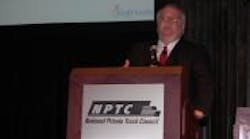“It’s not about the cost of equipment, people, pay and benefits; it’s not about volumes in individual lanes. The question companies must ask themselves is this: what’s the best [transportation] choice for handling highly critical freight? That’s where the private fleet comes into play.” –Mike Cole, director-North American transportation, Kraft Foods Inc.
Last week at the National Private Truck Council’s 2010 annual meeting in Cincinnati, the director of North American transportation for Kraft Foods – Mike Cole – spoke about making the case for private fleet operations in today’s rough-and-tumble freight environment.
A lot of companies view private fleets as nothing more than a very expensive line item in their budgets; one that can easily be replaced by for-hire carrier. Others – like Cole – believe not only that there’s a vital role for private fleets to play in the freight world today, but that entire debate over transportation must change.
To his mind, it’s not about private fleet vs. for-hire carrier or even in-house transportation management vs. outsourcing. For shippers today and the transportation networks that move their goods, it’s all about flexibility, safety, sustainability, and of course on-time deliveries in the most cost-efficient manner possible.
From this viewpoint, Cole explained, it’s about maintaining a “mix” of transportation options. Sometimes, switching from trucks to intermodal or even ships is a more cost-efficient and environmentally friendly move. At others, though, a private fleet proves vital – especially when something unexpected in the supply chain occurs; and as we all know, such occurrences are not rare.
“A private fleet is valuable because it can turn on a dime and it offers a level of commitment to the business that you don’t always get from for-hire carriers or brokers,” he noted. That being said, a private fleet can’t – and shouldn’t – do it all, Cole stressed, and at times it’s more efficient to let for-hire carriers and other modes handle the freight.
“You have to look at things from a societal, environmental, and efficiency perspective – not from an emotional reaction to maintain private fleet exclusivity,” he said. For example, he pointed to a case where Kraft’s private fleet gave up some surge freight to a for-hire carrier, because that carrier was in a better position to handle it.
“It generated significant additional revenue for that carrier and relieved us of freight we couldn’t handle well from an internal perspective,” Cole said. “But we also built more trust with that carrier and got added service from them. It’s a shift that benefited us both beyond just the freight calculation.”
He pointed to a different example whereby Kraft shifted wheat shipments coming from Canada into the U.S. from truck to ship transit via the Great Lakes. “We went from 10,200 truck trips annually, generating 5.7 million pounds of CO2 [carbon dioxide] to 24 ship loads per year producing just 1.7 million pounds of CO2 – while using software planning tools to account for the transit time difference,” Cole noted.
Towards the end of his presentation, Cole put up an interesting slide comprised of 10 points he felt private fleets must closely adhere to going forward in order to keep themselves a relevant and vibrant part of their overall company’s business. Those points are:
• Deliver against company commitments for safety, service, and financial metrics
• Know your costs
• Stick to your knitting
• Reach out to customers, peers, suppliers, and industry associations
• Invest in people and technology
• Communicate value relentlessly
• The company comes before the fleet
• Proactively justify your operation
• Flexibility – evolve with business needs
• Plan for the future – never take yourself for granted
“Justification of the private fleet usually comes up about every two years,” Cole added. “That’s why private fleets must stay inter-connected not just within their companies but within the transportation industry as a whole. We bring a lot of value in the table not just by carrying company freight at a more efficient cost but helping bring greater efficiencies to the entire supply chain – even by giving up some of that freight.”
Even now, Cole is working on getting more of the data collected and analyzed on the manufacturing side of Kraft’s global business to filter down to transportation.
“If we can develop a better ‘porthole’ for viewing the demand and planning factors in our manufacturing operations, we can better plan how to serve their needs in terms of handling surge volumes,” he said. “We can also share that information with our core for-hire carriers so they can plan out capacity availability better. It brings out a whole new level of cooperation on the transportation side of our business if we can share in the information generated from other divisions. That helps us plan better.”
And at the end of the day, that’s what it’s all about in the freight world, isn’t it?






